#LIKE ANAKIN LITERALLY TAKES TIME IN THIS INCREDIBLY CRITICAL MOMENT WHERE HE NEEDS ALL OF HIS FOCUS TO NOT DIE AND KILL ALL OF THEM
Note
IN AN R2ANI WAY!!!!! i’m so sorry i left any room for doubt i’m insane about the fact that r2 is sitting right next to his boytoy bf who he is going to fuck as soon as they land 🩷🩷🩷🩷🩷🩷
U KNOW ANON I HAD A FEELING IT WAS R2ANI. i am just an Overthinker and went "oh. what if it's not that and i make a fool out of myself" (which i already do plenty tbh but still 🙈)
BUT ALAS YOU ARE SO RIGHTTTTT
U KNOW WHAT MAKES ME CRAZY IN THAT SCENE. IS THAT ANAKIN CHECKS UP ON R2!!!!!!!! r2 screaming and anakin’s "easy r2" is so important to me
and it's so funny bc palpatine is literally next to r2 but anakin doesn’t even spare him a glance GDJFHFJF literally the whole plan is to save PALPATINE. and r2 is the one who's most likely to survive out of all of them if anything goes wrong too.
but anakin’s like... r2... u're gonna be ok dw i gotchu. palpatine who? obi-wan who?
but yeah anakin absolutely got fucked by his droid bf when they landed <3333333
#it's what he deserves when he did such a good job 😌#sw#r2ani#LIKE ANAKIN LITERALLY TAKES TIME IN THIS INCREDIBLY CRITICAL MOMENT WHERE HE NEEDS ALL OF HIS FOCUS TO NOT DIE AND KILL ALL OF THEM#TO REASSURE HIS DROID. TO TELL HIM THAT HE'S GONNA BE FINE#they're crazy crazy#f.ask#also anon i had literally been missing them thank u for this 🥺 r2ani my beloveds <3
2 notes
·
View notes
Photo
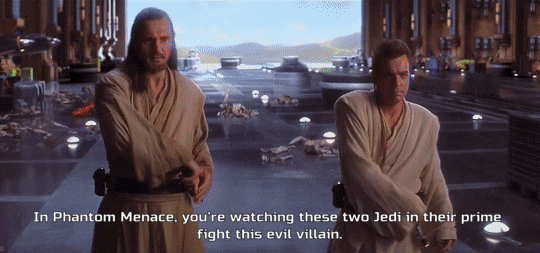
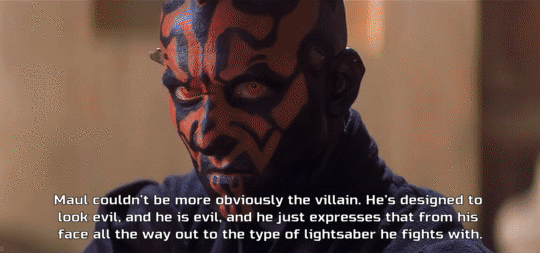


OKAY, IF I’M GONNA DO THIS, I’M GONNA DO IT PROPERLY. WHICH MEANS YEAH IT’S GONNA GET REALLY LONG.
A couple of things to say ahead of time: Lucasfilm’s Story Group has always said CANON > WORD OF GOD when it comes to these matters, so when I quote canon examples from supplementary materials that contradict what he says, that’s LF’s official position, but that doesn’t mean that an influential person like Dave’s views couldn’t affect how things will be shaped in the future, like Deborah Chow listening to this may be influenced by it on the Obi-Wan show, despite that Master & Apprentice contradicts him. It’s an incredibly murky area! Mileages are going to vary.
Another thing to keep in mind is that Dave Filoni never worked on The Phantom Menace, that was long, long before his time at Lucasfilm (which I think he joined sometime around 2007? and TPM was released in 1999), that he has worked with George more than probably anyone else, but we cannot and should not treat him as infallible or the True Authority on things, because even Dave himself has said things like:
“I mean, I know why I did that and what it means, but I don't like to explain too much. I love for the viewers to watch stuff and come up with their own theories -- and they frankly come up with better things that I intended.” --Dave Filoni, Entertainment Tonight 2020 interview
Or, in the same episode as the above Qui-Gon interpretation:
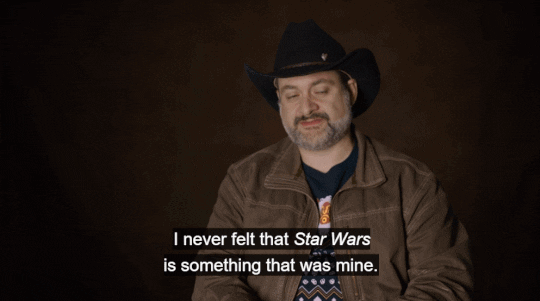


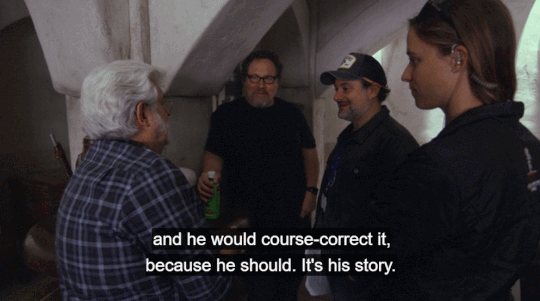
So, when I dig into this, I’m not doing this out of a sense of malice or even that I suddenly hate Dave or don’t appreciate all the incredible things he’s brought to SW, but in that I disagree with his take, Dave understands that he doesn’t always get it right, that he enjoys that fans come up with different things than he does and sometimes he likes those even more. There’s room for both of us and, for all that Dave mentions George a lot (and, hey, fair enough, the guy worked with George and I’m just quoting what George Lucas has said) doesn’t mean that this is straight from George, especially because I have never seen George Lucas utter so much as a peep about how the Jedi were responsible for Anakin’s fall. He has explicitly and frequently talked about how Anakin’s fall was his own choice, as well as I’ve never seen him say anything Jedi-critical beyond “they were kind of arrogant about themselves”. I have read and watched every George Lucas interview I could get my hands on and maybe I’m still missing something, but that’s literally the extent of him criticizing the Jedi I have EVER seen.
(It’s from the commentary on AOTC where he put in the scene with Jocasta to show they were full of themselves, but I also think it’s fair to point out that Obi-Wan immediately contradicts this by going to Dex for help, showing that it’s not necessarily a Jedi-wide thing.)
Before I go further, I want to say: this is not a post meant to tear down Qui-Gon, he is a character I actually really do love, but the focus is on showing why the above interpretation of him is wrong, which means focusing on Qui-Gon’s flaws. He has many wonderful qualities, he is someone who cared deeply and was a good person, I think things would have been better had he lived! But Anakin’s choices did not hinge on him, because Anakin’s choices were Anakin’s, that has always been the consistent theme of how George talks about him, the way he talks about the story is always in terms of “Anakin did this” or “Anakin chose that”, and the Jedi are very consistently shown as caring, they believed very much in love and Dave’s own show (well, I say “his own show”, but honestly TCW was George’s baby primarily and he had a lot of direct, hands-on say in crafting it, through at least the first five seasons) is plenty of evidence of that.
I’m not going to quote the full thing because this is already a monster post, I’m just going to focus on the Jedi stuff, because I like the other points a lot, but if you want the full text, it’s here. The relevant part is:
“In Phantom Menace, you’re watching these two Jedi in their prime fight this evil villain. Maul couldn’t be more obviously the villain. He’s designed to look evil, and he is evil, and he just expresses that from his face all the way out to the type of lightsaber he fights with. What’s at stake is really how Anakin is going to turn out. Because Qui-Gon is different than the rest of the Jedi and you get that in the movie; and Qui-Gon is fighting because he knows he’s the father that Anakin needs. Because Qui-Gon hasn’t given up on the fact that the Jedi are supposed to actually care and love and that’s not a bad thing. The rest of the Jedi are so detached and they become so political that they’ve really lost their way and Yoda starts to see that in the second film. But Qui-Gon is ahead of them all and that’s why he’s not part of the council. So he’s fighting for Anakin and that’s why it’s the ‘Duel of the Fates’ – it’s the fate of this child. And depending on how this fight goes, Anakin, his life is going to be dramatically different.
“So Qui-Gon loses, of course. So the father figure, he knew what it meant to take this kid away from his mother when he had an attachment, and he’s left with Obi-Wan. Obi-Wan trains Anakin at first out of a promise he makes to Qui-Gon, not because he cares about him. When they get Anakin, they find him on Tatooine, he says “Why do I feel like we’ve found another useless lifeform?” He’s comparing Anakin to Jar Jar and he’s saying “this is a waste of our time, why are we doing this, why do you see importance in these creatures like Jar Jar Binks and this ten-year-old boy? This is useless.”
“So, he’s a brother to Anakin eventually but he’s not a father figure. That’s a failing for Anakin. He doesn’t have the family that he needs. He loses his mother in the next film. He fails on this promise that he made, “mother, I’m going to come back and save you”. So he’s left completely vulnerable and Star Wars is ultimately about family. So that moment in that movie which a lot of people I think diminish, “oh there’s a cool lightsaber fight”, but it’s everything that the entire three films of the prequels hangs on, is that one particular fight. And Maul serves his purpose and at that point died before George made me bring him back, but he died.“ --Dave Filoni
I’m going to take this a piece at a time to show why I really disagree with the content of both the movies and The Clone Wars supporting what Dave says and, instead, contradicts it a lot.
The rest of the Jedi are so detached and they become so political that they’ve really lost their way and Yoda starts to see that in the second film.
He doesn’t explain what this means, but I’m pretty sure that he’s referring to this conversation:
OBI-WAN: “I am concerned for my Padawan. He is not ready to be given this assignment on his own yet.”
YODA: “The Council is confident in its decision, Obi-Wan.”
MACE WINDU: “The boy has exceptional skills.”
OBI-WAN: “But he still has much to learn, Master. His abilities have made him... well.... arrogant.”
YODA: “Yes, yes. A flaw more and more common among Jedi. Hmm... too sure of themselves they are. Even the older, more experienced ones.”
MACE WINDU: “Remember, Obi-Wan, if the prophecy is true, your apprentice is the only one who can bring the Force back into balance.”
OBI-WAN: "If he follows the right path.”
None of that has anything to do with being “detached” and, further, I think this is something that’s come up with Dave’s view of Luminara a lot, because he’s described her (re: the Geonosis arc): “We were trying to illustrate the difference between the way Anakin is raising his Padawan, and how much he cares about her, and the way Luminara raises her Padawan. Not that Luminara is indifferent, but that Luminara is detached. It’s not that she doesn’t care, but she’s not attached to her emotionally.”
Here, he says that the Jedi care, in the above, he says that the Jedi don’t care, which makes me think there’s a lot of characterization drift as time goes on, especially when fandom bombards everyone with the idea that the Jedi were cold, emotionless, and didn’t care. However, look at Luminara’s face in that arc, when she’s talking with Anakin:
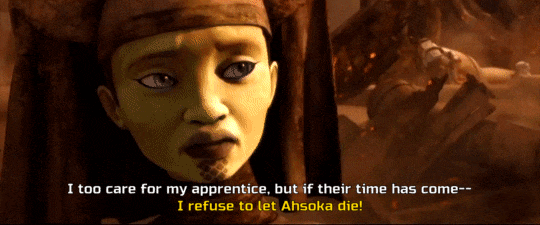
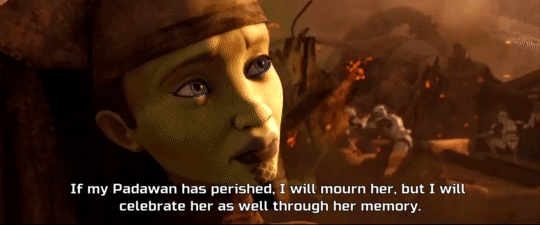
That is not the face of someone who doesn’t care. She even smiles brightly in relief when Barriss is shown to be okay, that this really doesn’t convey “detached” in an unloving or uncaring way. (We’ll get to attachment later, that’s definitely coming.)
(I’m also mostly skipping the political thing, because I think that’s just a fundamental disagreement of whether Jedi should or should not lean into politics. My view basically boils down to that I think ALL OF US should be leaning more into politics because we are citizens who live in the world and are responsible for it, and the Jedi are no different. This is evidenced by:
- M&A’s storyline has Qui-Gon and Obi-Wan saving the day specifically because they play politics, that’s how they manage to free the slaves, through playing politics and being part of the Republic/having Senate backing.
- The Clone Wars has shown that the Jedi believe “lasting change can only come from within” and “it’s every citizen’s duty to hold their leaders accountable” when Ahsoka teaches the cadets on Mandalore, as well as that politics are not inherently bad, given that Padme and Bail are working to make the system better or “create lasting change from within [the system]”
- "Trying to serve the greater good does not always make you popular” says Padme Amidala in a very caring speech
- Star Wars Propaganda makes the case that the Jedi might have won the war had they leaned more into politics.
- Sometimes the Jedi get unfairly accused of playing politics when there’s just no good choice and they still have to choose one or the other.)
But Qui-Gon is ahead of them [re: caring and loving] all and that’s why he’s not part of the council.
This is flat-out wrong in regards to canon. Mileages are going to vary, of course, on how much one takes a novel into consideration, but Dave Filoni is not a fan with the luxury of deciding what is or isn’t canon, he works on Star Wars where canon is canon. Now, does that mean canon will never contradict itself, especially if Dave gets to write something for Qui-Gon? Of course not, SW isn’t immune to continuity errors and they themselves have never said otherwise, even when fans want to hold them to that standard.
However, this is still pretty much a big “that’s not what happened” instance. In Master & Apprentice, the Jedi Council offer a seat to Qui-Gon on the Council, specifically BECAUSE he has different opinions from them and they welcome that. (Excerpt here.)
“We hope it will also be our gain,” Mace replied. “Qui-Gon Jinn, we hereby offer you a seat on the Jedi Council.”
Had he misheard? No, he hadn’t. Qui-Gon slowly gazed around the circle, taking in the expressions of each Council member in turn. Some of them looked amused, others pleased. A few of them, Yoda included, appeared more rueful than not. But they were serious.
“I admit—you’ve surprised me,” Qui-Gon finally said.“I imagine so,” Mace said drily. “A few years ago, we would’ve been astonished to learn we would ever consider this. But in the time since, we’ve all changed. We’ve grown. Which means the possibilities have changed as well.”
Qui-Gon took a moment to collect himself. Without any warning, one of the turning points of his life had arrived. Everything he said and did in the next days would be of great consequence. “You’ve argued with my methods often as not, or perhaps you’d say I’ve argued with yours.”
“Truth, this is,” Yoda said.
Depa Billaba gave Yoda a look Qui-Gon couldn’t interpret. “It’s also true that the Jedi Council needs more perspectives.”
Ultimately, Qui-Gon is the who turns them down and gives up a chance to shape the Jedi Council because he doesn’t like the shape they’re taking. That he does become less political, but this is after he’s argued that the Jedi should be working to push the Senate harder, so when he has a chance to help with that, he turns it down. It has nothing to do with caring and loving, it’s about Qui-Gon’s desire to not have to deal with the work himself, when he wants to be more of a hippie Jedi. (I’ve written a lot about Qui-Gon in M&A, why I actually think it’s really spot-on to someone who can be both really kind and really kind of a dick, but it’s not the most flattering portrayal, even if narrative intention likely didn’t mean what came across to me. I think this post and this post are probably the most salient ones, but if you want something of an index of the web that’s being woven with all the various media, this one is good, too.)
So he’s fighting for Anakin and that’s why it’s the ‘Duel of the Fates’ – it’s the fate of this child. And depending on how this fight goes, Anakin, his life is going to be dramatically different.
I have only ever seen George Lucas talk about Anakin’s fate in one instance and it’s this: “It’s fear of losing somebody he loves, which is the flipside of greed. Greed, in terms of the Emperor, it’s the greed for power, absolute power, over everything. With Anakin, really it’s the power to save the one he loves, but it’s basically going against the Fates and what is natural.“ –George Lucas, Revenge of the Sith commentary
I’ve made my case about why I think Anakin’s fate is about that moment in Palpatine’s office, and so I’m not fundamentally opposed that “Duel of the Fates” is about Anakin’s fate, but here’s what George has provably said about the “Duel of the Fates” part of the story:
- In the commentary for The Phantom Menace during “Duel of the Fates” and none of Dave’s speculation is even hinted at, there’s more focus on the technical side of things and the most George talks about is that it’s Obi-Wan who parallels Luke in going over the edge during the fight, except that instead of a Sith cutting off a Jedi’s hand, it’s a Jedi cutting a Sith in half, drawing the parallels between them.
- He does say of the funeral scene that this is where Obi-Wan commits to training Anakin and how everything is going to go (though, in canon we see that Obi-Wan still struggles with this a bit, but Yoda is there to support him and nudge him into committing even more to Anakin, because the Jedi are a supportive community to each other). This is some solid evidence for that Obi-Wan is already caring about Anakin beyond just Qui-Gon.
- Then here’s what he says about the “Duel of the Fates” fights and themes of them in "All Films Are Personal":
George Lucas: “I wanted to come up with an apprentice for the Emperor who was striking and tough. We hadn’t seen a Sith Lord before, except for Vader, of course. I wanted to convey the idea that Jedi are all very powerful, but they’re also vulnerable — which is why I wanted to kill Qui-Gon. That is to say, “Hey, these guys aren’t Superman.” These guys are people who are vulnerable, just like every other person.
“We needed to establish that, but at the same time, we wanted the ultimate sword fight, because they were all very good. It sort of predisposes the sword fight between Anakin and Obi-Wan later on. There’s real purpose to it. You have to establish the rules and then stick with them. The scene illustrates just how Jedi and Sith fight and use lightsabers.”
“So Qui-Gon loses, of course. So the father figure, he knew what it meant to take this kid away from his mother when he had an attachment, and he’s left with Obi-Wan. Obi-Wan trains Anakin at first out of a promise he makes to Qui-Gon, not because he cares about him.
We’ll get to the “attachment to his mother” thing in a bit--but, for now, let’s just say, George Lucas’ words on this are not that attachment to her was a good thing.
Fair enough that “not because he cares about him” is up to personal interpretation, but canon has also addressed the topic of Obi-Wan’s treatment of Anakin and Obi-Wan stepped up to the plate on this. In addition to how we see Obi-Wan REPEATEDLY being there for Anakin and being concerned and caring about him, they specifically talk about Qui-Gon and overcome this hurdle.
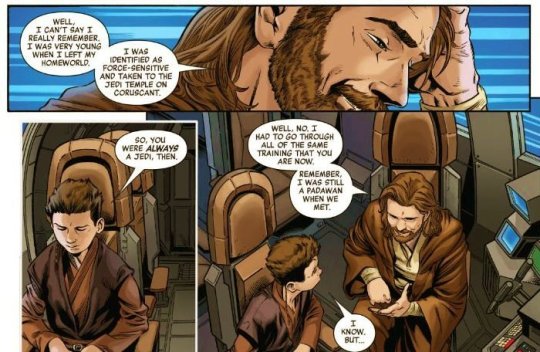
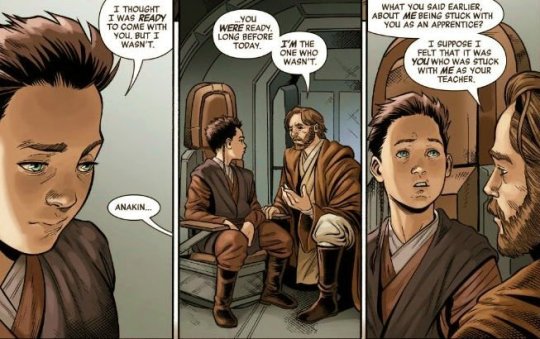
No, Obi-Wan is not Anakin’s father figure, on that we definitely agree. Anakin never really even treats Obi-Wan like a father--he says “you’re the closest thing I have to a father” in Attack of the Clones, as well as he says Obi-Wan practically raised him in The Clone Wars “Crystal Crisis” story reels, but Anakin has never actually acted like Obi-Wan is his father--”then why don’t you listen to me?” Obi-Wan points out in AOTC--as well as Obi-Wan glides past those remarks, which I’ve always taken that he doesn’t want to reject Anakin’s feelings, knowing that Anakin can be sensitive about them, but neither does he want to confirm them.
This does not mean Obi-Wan was not supportive, caring, and loving. He says, “I loved you!” to Anakin in Revenge of the Sith, he asks after him and if he’s sleeping well in Attack of the Clones, and even George Lucas himself said that the elevator scene was set up TO SHOW OBI-WAN AND ANAKIN CARE FOR EACH OTHER:
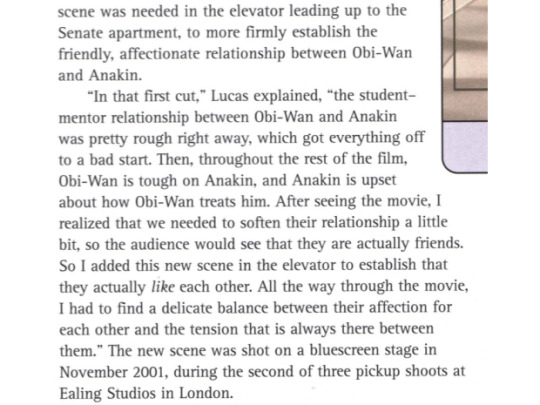
PUTTING THE REST UNDER A READ MORE FOR A BETTER LENGTH REBLOGGABLE VERSION, IF YOU WANT.
This is further evidenced by how the Jedi do see themselves as family, they just don’t need to put it into strict nuclear family dynamics:
- “You were my brother, Anakin! I loved you!” [–Obi-Wan Kenobi, Revenge of the Sith]
- “We are brothers, Master Dibs.” [–Mace Windu, Jedi of the Republic - Mace Windu]
- “Did your parents bicker?” she asked. “The adoptive ones, I mean.”
A slow smile broke across Ashla’s face, curling first one side of her mouth and then the other. Whatever she was remembering, Kaeden could tell it was good.
"All the time,“ Ashla said, almost as if she were talking to herself. [–Kaeden Larte, Ahsoka Tano, Ahsoka]
- Vos, brought to the Temple even younger than most, felt that he had hundreds of brothers and sisters, and it seemed that whenever he went into the dining hall he ran into at least half of them. [Dark Disciple]
- “It was not his birthplace, exactly, but the Jedi Temple was where Quinlan Vos had grown up. He’d raced through its corridors, hidden behind its massive pillars, found peace in its meditation hall, ended-and started-fights in rooms intended for striking blows and some that weren’t, and sneaked naps in its library. All Jedi came here, at some point in their lives; for Quinlan, it always felt like coming home when he ran lightly up the stairs and entered the massive building as he did now.” [Dark Disciple]
Brothers, sisters, and other more non-traditional kinds of family are not lesser and Obi-Wan and Anakin absolutely were family, just as the Jedi are all family to each other, so, no, there was no “failing” Anakin, except in Anakin’s mind, perhaps. (In that, I can agree. But not on a narratively approved level, canon too thoroughly refutes that for me.)
Rebels as well pretty thoroughly shows that non-traditional families are meaningful and just as important--we may joke that Hera is “space mom”, but she’s not actually Ezra or Sabine’s mother, Kanan is not actually their father, and even if they sometimes stray into aspects of those roles (as the Jedi do as well in the movies and TCW), that they don’t need that traditional nuclear family structure. Mentor figures--and Kanan is Ezra’s mentor--are just as meaningful and needful as a “dad”. And I’m kind of :/ at the implication that anyone without a dad/father figure or mom/mother figure is being “failed”.
When they get Anakin, they find him on Tatooine, he says “Why do I feel like we’ve found another useless lifeform?” He’s comparing Anakin to Jar Jar and he’s saying “this is a waste of our time, why are we doing this, why do you see importance in these creatures like Jar Jar Binks and this ten-year-old boy? This is useless.”
Whether or not Obi-Wan is being genuinely dismissive in this movie (I think you could make a case either way), the idea that Qui-Gon is better than Obi-Wan about this, as shown through Jar Jar isn’t exactly very supported given how Qui-Gon and Jar Jar first exchange words:

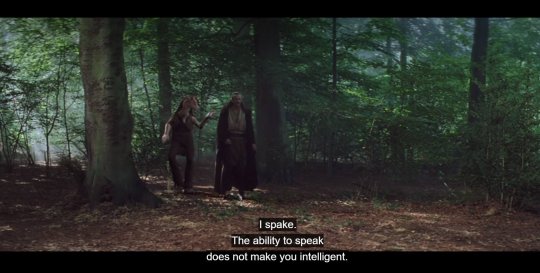
QUI-GON: “You almost got us killed. Are you brainless?”
JAR JAR: “I spake.”
QUI-GON: “The ability to speak does not make you intelligent.”
Qui-Gon is just as bad as everyone else to Jar Jar, he’s not somehow elevated above them.
It’s also baffling because, Dave, I have watched your show. The Jedi are specifically shown to be kind to people and creatures, not considering them “useless”. Henry Gilroy (who was the co-writer for The Clone Wars and frequently appeared in featurettes on the same level as Dave Filoni) explicitly draws this to The Jedi Way, that “life is everything to the Jedi“, when he said this about the Ryloth episodes:
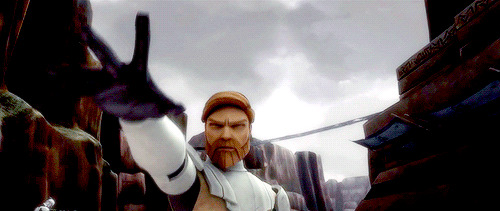
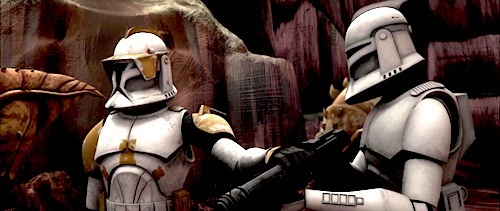
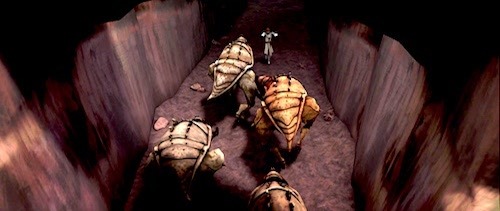
(Caps cribbed from Pan’s blog, because I cannot make another gif, save me, please.)
Henry Gilroy in an Aggressive Negotiations Interview: "Obi-Wan truly is a Jedi in that he’s like, ‘Okay, I’m not going to murder these creatures [in the Ryloth arc of The Clone Wars]. They’re starving to death. They’ve basically been unleashed against these people as a weapon, but it’s not their fault. They’re just doing what they do. They’re just animals who wanna eat.’
"So the idea was–and I think there was an early talk about how, 'Oh, yeah, he’ll go running through them and slicing and dicing them and chop them all up or whatever, and save his guys. And I’m like, 'Yeah, but that’s not really the Jedi way. He’s not just gonna murder these creatures.’
"And I know the threat is [there], to save one life you have to take one, but the idea of him [is]: why can’t Obi-Wan just be more clever? He basically draws them in and then traps them.
"It says something about who the Jedi are, they don’t just waste life arbitrarily. And someone could have gone, 'Oh, yeah, but it would have been badass if he’d just ran in there with his lightsaber spinning and stabbed them all in the head!’ And 'Yeah, you’re right, I guess he could be that, but he’s trying to teach his clones a lesson right then, about the sanctity of life.’
"That is the underlying theme of that entire episode. Which is: A tactical droid is using the people as living shields. Life means nothing to the Separatists. The droids. But life is everything to the Jedi. And even though he doesn’t have to say that, it’s all through the episode thematically.“
It’s also Obi-Wan who teaches Anakin about kindness to mindless creatures in the Obi-Wan & Anakin comic:

"These beasts are nearly mindless, Anakin. I can feel it. They are merely following their nature, they should not die simply because they crossed our path. Use the Force to send them on their way.”
Now, fair enough if you want to say Obi-Wan was taught by Qui-Gon, but also Qui-Gon is dead by that point and Obi-Wan growing into being more mature is his own accomplishment, not Qui-Gon’s, especially given that we see Qui-Gon himself being pretty dismissive to Jar Jar in TPM.
This isn’t unique thing either, Padme is incredibly condescending to Jar Jar in “Bombad Jedi” and expresses clear annoyance with him to C-3PO when sighing over him. Jar Jar is a character you kind of have to warm up to, pretty much the only one we’ve seen consistently being favorable to him is Yoda (and maybe Anakin, though, Anakin doesn’t really interact with him a ton) and Mace Windu warms up to him considerably in “The Disappeared” and even specifically is shown to be teaching him and helping him, which is a huge theme of the Jedi and how much they care.
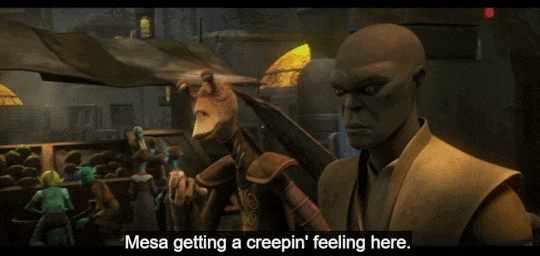
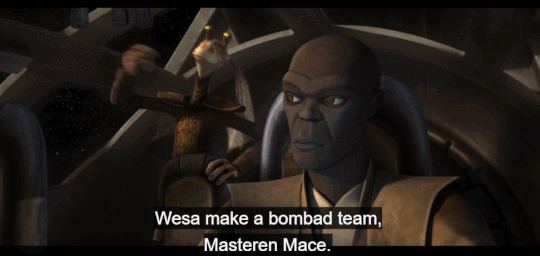
So, ultimately, the point I’m winding my way towards is--the other Jedi do show kindness and consideration to Jar Jar Binks, including characters like Mace Windu, so if you’re judging the Jedi based on that, the conclusion of Qui-Gon somehow being more compassionate and loving is really pretty thoroughly disproved by The Phantom Menace and The Clone Wars themselves.
So, he’s a brother to Anakin eventually but he’s not a father figure. That’s a failing for Anakin. He doesn’t have the family that he needs. He loses his mother in the next film. He fails on this promise that he made, “mother, I’m going to come back and save you”. So he’s left completely vulnerable and Star Wars is ultimately about family.
You could be charitable and say this is just from Anakin’s point of view that it’s a “failing”, but within the context of what Dave’s saying, it’s clearly meant as a more narratively approved take, not just Anakin’s point of view, and I really, really dislike the idea that Anakin--or anyone, really--needs a traditional nuclear family, ie a “mom” and/or a “dad”, or else it’s a “failing” for them.
Setting aside that the idea that Qui-Gon would need to be Anakin’s dad to be kind to hi (which is ?????) is contradicted by The Clone Wars as well. Yes, Qui-Gon is warm with Anakin in several scenes, which is what Dave is presumably drawing on to show that Qui-Gon believed the Jedi should be caring and loving, but you know who else is warm to younglings? OTHER JEDI COUNCIL MEMBERS.
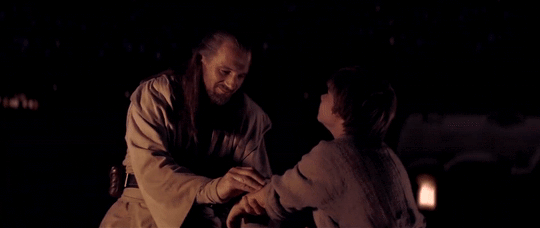
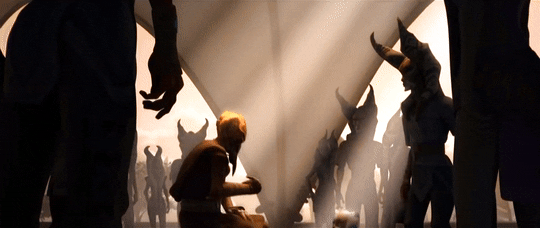
Those two scenes have the exact same kind of warmth to them. Ie, THE JEDI ALL BELIEVED IN BEING LOVING AND KIND, NOT JUST QUI-GON. The things evidenced to show Qui-Gon was loving and kind are evidenced just as much��in other Council members, in Dave’s own show.
As a bonus--have Mace Windu, known Jedi Council member, being super kind and loving towards a young Twi’lek girl he just met in a canon comic:
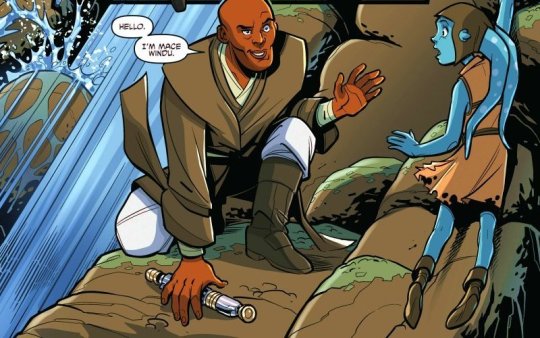
But I know that this is about the way the Council treated Anakin in The Phantom Menace testing scene, but here’s the thing--when I go back and I watch that scene and the Jedi aren’t ever mean to him, they’re neutral in an official testing situation, where they are trying to determine if he’s able to adapt to the Jedi ways. They never once say he’s bad for holding onto his fear, only that he does--which Anakin digs his heels in and gets angry about, he can’t really even admit that he’s afraid and that’s a huge deal for the Jedi.
I’ve made a longer post about it here (and here), but the basic gist is:
- That scene has Yoda giving the famous “Fear leads to the dark side” speech which is almost word for word how George Lucas describes how the Force works, showing the Jedi are narratively correct
- “Confronting fear is the destiny of a Jedi” may be from the sequels, but it is thoroughly supported by the movies and TCW and Rebels and even supplementary canon material, including that the Jedi literally design their tests around both Masters and Padawans for it (Ilum, the Jedi Temple on Lothal, etc.
- Anakin cannot admit to his fears in that TPM scene
- We have examples of Jedi younglings do admit to their fears and the point isn’t not to have them, but to face them--the younglings in “The Gathering” are the most blatant example of this, but it’s also pretty much the entire theme of Jedi: Fallen Order, especially when Cal goes to Ilum to face his fears and get another kyber crystal.
The point isn’t that Anakin--who has very good reasons to be afraid! nothing in the story or the Jedi have said he didn’t!--is wrong or bad, but that he’s not a great fit for the Jedi life because he is “unwilling to accept [Jedi philosophy] emotionally”. And they’re right about this, because this is how George Lucas describes Anakin in commentary:
“The fact that everything must change and that things come and go through his life and that he can’t hold onto things, which is a basic Jedi philosophy that he isn’t willing to accept emotionally and the reason that is because he was raised by his mother rather than the Jedi. If he’d have been taken in his first year and started to study to be a Jedi, he wouldn’t have this particular connection as strong as it is and he’d have been trained to love people but not to become attached to them.” --George Lucas, Attack of the Clones commentary
And so this brings us to A T T A C H M E N T, which, yeah, we’ve been having this discussion forever, but I’m going to state it again: Within Star Wars, ATTACHMENT IS NARRATIVELY A BAD THING. It is consistently tied to possessive, obsessive relationships, to greed and an unwillingness to let things go when it’s time (letting go is a huge theme in Star Wars) and equating love with attachment is fundamentally wrong according to George Lucas’ Star Wars worldbuilding:
“The Jedi are trained to let go. They’re trained from birth,” he continues, “They’re not supposed to form attachments. They can love people-- in fact, they should love everybody. They should love their enemies; they should love the Sith. But they can’t form attachments. So what all these movies are about is: greed. Greed is a source of pain and suffering for everybody. And the ultimate state of greed is the desire to cheat death.” --George Lucas, The Making of Revenge of the Sith
If attachment and love were the same thing, then he would be saying, “They should love their enemies, they should love the Sith. But they can’t love.” The way George makes the distinction shows that, no, attachment and love aren’t the same thing at all, attachment is not caring. Further, there’s another instance of him showing there’s an important distinction between relationships and attachment and the association of attachmets with possession: "Jedi Knights aren’t celibate - the thing that is forbidden is attachments - and possessive relationships.” --George Lucas, BBC News interview
So, yes, when Anakin is attached to people, it is directly tied to obsession, possession, and greed, all things of the dark side:
“He turns into Darth Vader because he gets attached to things. He can’t let go of his mother; he can’t let go of his girlfriend. He can’t let go of things. It makes you greedy. And when you’re greedy, you are on the path to the dark side, because you fear you’re going to lose things, that you’re not going to have the power you need.” --George Lucas, Time Magazine
“But he has become attached to his mother and he will become attached to Padme and these things are, for a Jedi, who needs to have a clear mind and not be influenced by threats to their attachments, a dangerous situation. And it feeds into fear of losing things, which feeds into greed, wanting to keep things, wanting to keep his possessions and things that he should be letting go of. His fear of losing her turns to anger at losing her, which ultimately turns to revenge in wiping out the village. The scene with the Tusken Raiders is the first scene that ultimately takes him on the road to the dark side. I mean he’s been prepping for this, but that’s the one where he’s sort of doing something that is completely inappropriate.“ --George Lucas, Attack of the Clones commentary
ATTACHMENT IS BAD IN STAR WARS AS THEY DEFINE IT.
Finally, I’m going to circle back to:
Because Qui-Gon is different than the rest of the Jedi and you get that in the movie; and Qui-Gon is fighting because he knows he’s the father that Anakin needs. Because Qui-Gon hasn’t given up on the fact that the Jedi are supposed to actually care and love and that’s not a bad thing.
Here’s the thing about this: You know who else, by this logic, Qui-Gon should have been a father to? OBI-WAN KENOBI.
This isn’t said as “Anakin specifically needs a father” (which I think would be an interesting idea to bandy about and I’m not disagreeing, though, it’s complicated because of what Anakin refuses to accept emotionally), it’s said in a bigger context, that Qui-Gon is better than the other Jedi because he understands the need for fathers (and thus this ties into Return of the Jedi) and he’s ahead of the other Jedi, who apparently think loving and caring about people are bad things, but Qui-Gon does not treat Obi-Wan like his son. Or, if he does, he’s not exactly a stellar dad about it.
Within Master & Apprentice, there’s an incredibly consistent theme of how Qui-Gon thinks supportive things about Obi-Wan, but never says them aloud. He thinks he should talk to Obi-Wan about the upcoming decision to be on the Council and then never does. He could have explained why he kept Obi-Wan training the basics but he never does. There are multiple instances showing that Qui-Gon is actually really, really bad at actually handling a young apprentice who needs him to talk to them about important things. Qui-Gon continues this in From a Certain Point of View where he still never talked to Obi-Wan about everything that happened, even after he became a Force Ghost.
Damn, damn, damn. Qui-Gon closed his eyes for one moment. It blocked nothing; the wave of shock that went through Obi-Wan was so great it could be felt through the Force. Qui-Gon hadn’t thought Kirames Kaj would mention the Jedi Council invitation. It seemed possible the soon-retiring chancellor of the Republic might not even have taken much note of information about a new Council member. --Master & Apprentice
That comment finally pierced Qui-Gon’s damnable calm. There was an edge to his voice as he said, “I suspected you would be too upset to discuss this rationally. Apparently I was correct.”
“I thought you said my reaction was understandable,” Obi-Wan shot back. “So why does it disqualify me from hearing the truth?”
Qui-Gon put his hands on his broad belt, the way he did when he was beginning to withdraw into himself. “…we should discuss this at another time. Neither of us is his best self at the present.” --Master & Apprentice
Obi-Wan walked toward the door, obviously outdone. “At the beginning of my apprenticeship, I couldn’t understand you,” he said. “Unfortunately, that’s just as true here at the end.”
Only yesterday they had worked together as never before. How did Qui-Gon manage to get closer to Obi-Wan at the same time he was moving further away?
Just before Obi-Wan would leave the room, Qui-Gon said, “Once, you asked me about the basic lightsaber cadences. Why I’d kept you there, instead of training you in more advanced forms of combat.”
Obi-Wan turned reluctantly to face him again. “I suppose you thought I wasn’t ready for more. The same way I’m not ready to believe in all this mystical—”
“That’s not why.”
After a long pause, Obi-Wan calmed to the point where he would listen. “Then why, Qui-Gon?”
“Because many Padawans—and full Jedi Knights, for that matter—forget that the most basic technique is the most important technique. The purest. The most likely to protect you in battle, and the foundation of all knowledge that is to come,” Qui-Gon said. “Most apprentices want to rush ahead to styles of fighting that are flashier or more esoteric. Most Masters let them, because we must all find our preferred form eventually. But I wanted you to be grounded in your technique. I wanted you to understand the basic cadences so well that they would become instinct, so that you would be almost untouchable. Above all, I wanted to give you the training you needed to accomplish anything you set your mind to later on.”
Obi-Wan remained quiet for so long that Qui-Gon wondered if he were too angry to really hear any of what he’d said. But finally, his Padawan nodded. “Thank you, Qui-Gon. I appreciate that. But—”
“But what?”
“You could’ve said so,” Obi-Wan replied, and then he left. --Master & Apprentice
"I owe you that. After all, I’m the one who failed you.“
"Failed me?”
They have never spoken of this, not once in all Qui-Gon’s journeys into the mortal realm to commune with him. This is primarily because Qui-Gon thought his mistakes so wretched, so obvious, that Obi-Wan had wanted to spare him any discussion of it. Yet here, too, he has failed to do his Padawan justice. --From a Certain Point of View, “Master and Apprentice”
(Further, in Master & Apprentice, Qui-Gon thinks that the Jedi give Rael Averross--who is HUGELY paralleled to Anakin--too many exceptions, were too soft on him because he came to the Jedi later than most and has trouble thinking of them as his family, and he thinks they should have been stricter with him.)
It’s also readily apparent within The Phantom Menace itself:
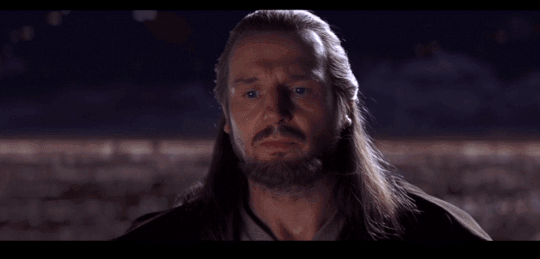
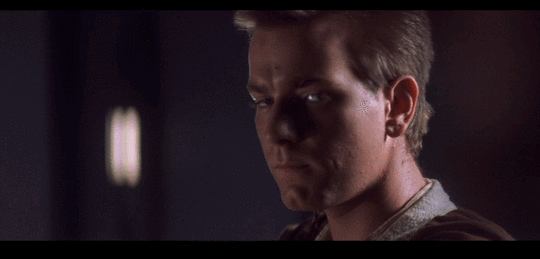
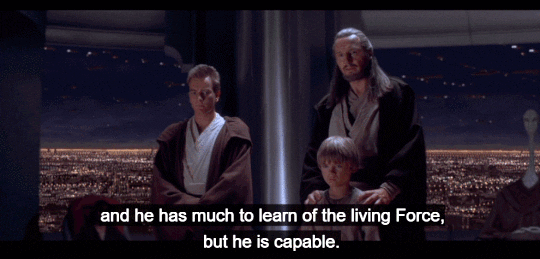

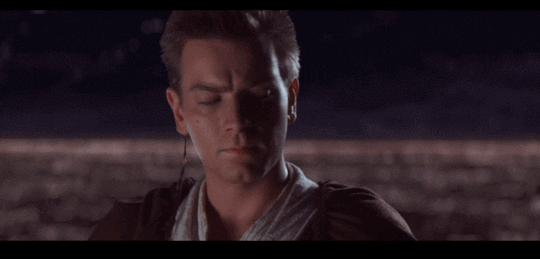
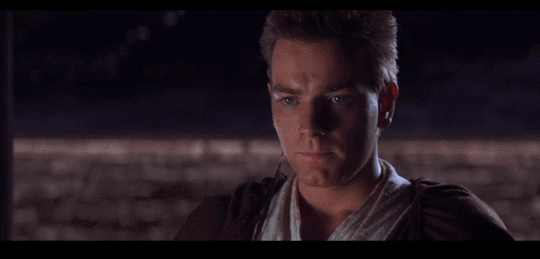
You can take some charitable views of this scene, that Qui-Gon was pushed into a corner where he had few other options (and this is the view I generally take even!), but this is after the entire movie where he’s never once indicated that Obi-Wan was ready, has instead indicated that he still has much to learn (not just of the Living Force, but in general), as well as made it clear that he’s still teaching Obi-Wan, like on the Trade Federation ship.
And I do think Obi-Wan got over this because he understood, because Obi-Wan actually is a very selfless person, he clearly cares (which is furthered by how we see him warm up to Anakin very quickly), but look at their faces.
This was not a good moment, and they do somewhat make up, where Qui-Gon says that Obi-Wan has been a good apprentice, that he’s wiser than Qui-Gon and he’ll be a great Jedi--but if we’re counting that as Qui-Gon being this great Jedi, then you can’t say Obi-Wan failed Anakin, given that we show him doing the exact same thing, except better. He tells Anakin, “You are strong and wise and will become a far greater Jedi than I could ever hope to be.”, echoing Qui-Gon’s words, but also he never threw Anakin aside for someone else.
This is kind of a major undercurrent throughout The Clone Wars, where Obi-Wan never takes another apprentice, where he continues to teach Anakin, to support him, even to the point of occasionally co-Mastering Ahsoka with him. “This has been quite a journey for our Padawan.”
Qui-Gon’s treatment of Obi-Wan in this scene isn’t the worst, he’s kind about it later (though, he never actually specifically apologizes for this), but we can see that this is a moment where Qui-Gon hurts Obi-Wan and knows it.
And you know what George Lucas has to say about Qui-Gon? This:
“So here we’re having Qui-Gon wanting to skip the early training and jump right to taking him on as his Padawan learner, which is controversial, and ultimately, the source of much of the problems that develop later on.” –George Lucas, The Phantom Menace commentary
There’s nothing about Qui-Gon being right or better than the other Jedi, but instead that Qui-Gon’s actions here are a source of much of the problems that develop later on.
So, ultimately, I liked some points Dave made in that speech, it’s a beautiful and eloquent one, but I thoroughly disagree with his interpretation of George’s intentions for Qui-Gon and I thoroughly disagree that that’s what the movies, The Clone Wars (DAVE’S OWN SHOW), and the supplementary canon show about Qui-Gon and the other Jedi. I still stand by my appreciation of Dave’s contributions to SW as a whole, I think he does a really good job at making Star Wars, but he doesn’t always get everything right and this is one thing where I think the canon and George’s commentary show otherwise, as much as I love his desire to defend the prequels’ importance in the story. Because, my friend, I have felt that every single day of my SW life.
963 notes
·
View notes
Note
D&P and Merther for the shipping ask game???
Yax I would die for you except you’d probably stop me from dying with your EMT wizardry and then where would we be
🖤 D/P 💙
1. What made you ship it?
I have eyes? But seriously, I like to joke about how my ships are either softboys and their badass women or queerbait m/m angst.... and then there’s this shining exception. A canon m/m ship that gets a love story and a happy ending :’’’) I started watching the show very casually, knowing David was queer but not that D/P was endgame and then the next thing I knew I had ascended to another plane of existence
2. What are your favorite things about the ship?
I am never not thinking about the Dynamic... it’s the complementary aspects of their personalities for me!
You’ve got David: flamboyantly queer and deeply dramatic, who’s had intense emotions his whole life that have scared people away but he’s also brave and unique and creative and wonderful. He’s everything that Patrick didn’t know he needed. He’s been hurt a lot of times and he almost doesn’t believe that he’s capable of being loved so wholly and completely. Enter Patrick.
Patrick is so straight-laced and repressed and invested in being well-liked that he had built up a whole seemingly perfect life that was making him deeply unhappy. I don’t think that even Patrick knew he was capable of loving David the way he does, because he hadn’t cast off his old life and gone on that emotional journey until he met David. His “you make me feel right” speech is my favorite bit of the entire show. Patrick found himself in finding David.
They balance each other: Patrick grounds David, providing him the unconditional love that David can flourish with, and David brings beauty and color into Patrick’s life.
I also adore how much casual intimacy they get on screen, all the kisses and shoulder touches. It’s incredibly healing to watch after so much queer angst and suffering, when we get representation at all.
3. Is there an unpopular opinion you have on your ship?
Yeah, Patrick’s not perfect. I get very pissy when people trash David for his actions surrounding the barbecue and/or the wedding and imply he was being unfair/selfish -- because even if he was, Patrick has a responsibility to communicate his concerns if he wants David to respond to them. Patrick has a tendency to avoid/repress his feelings and that can be incredibly damaging in a relationship if not addressed. David can’t read Patrick’s mind, nor should he be expected to. He doesn’t need to magically intuit Patrick’s distress from Patrick’s micro-expressions or whatever the fuck -- Patrick needs to step up and tell David when he doesn’t like David’s behavior. Yes, I’m projecting like hell when it comes to this but it is something that made me furious during season 6 and the discourse surrounding it.
------------
💙 Merthur ❤
1. What made you ship it?
I watched the first episode and was like “oh wow this show is even gayer than I’d heard it was.” No but seriously... fellas, is it gay to be literally and canonically someone’s other half? Fellas, is it gay to stare intensely into each other’s eyes at every given opportunity? Fellas, it is gay to dedicate your entire life to serving and protecting someone? Fellas, is it--
2. What are your favorite things about the ship?
ah jeez where do I even start... Arthur is Merlin’s whole world. Merlin’s magic is “only for Arthur” and Merlin’s magic is... everything he is. I literally don’t know how you could read that as Merlin not being in love with Arthur. I genuinely and honestly think this interpretation is backed up by commentary by the actors and writers: Merlin loves Arthur, and that’s not even a point of debate. I adore Merlin as a character (son boy baby sweetheart sunshine child) and his unwavering faith in Arthur, his dedication, his tenderness, the years spent protecting someone who didn’t even know how much Merlin had done for him.... it gets me good.
And then there’s what Merlin is to Arthur! Setting aside the stuff Arthur doesn’t know about, which I will talk about in a moment, Merlin is possibly the only person in Arthur’s life who has always, always treated him as a person first and a prince second. Merlin’s unwavering faith and freely given friendship are because he sees the best in Arthur, not because of Arthur’s hereditary right to the throne. Merlin is Arthur’s first and truest friend -- I know the knights and Gwen care for him, but there is a component of social discrepancy to their relationship that Merlin simply has ignored. Merlin’s disrespect is because he fundamentally views Arthur as his equal, which is a gift Arthur didn’t even know he needed. Arthur was touch-starved, emotionally repressed, and incredibly lonely before Merlin came into his life. (Yes, the similarities between my two OTPs are well-known to me.) Just because Arthur struggles to express his emotions (thanks, Uther) and doesn’t have the same plot opportunities as Merlin to show how much he’d sacrifice for Merlin, doesn’t mean he doesn’t love Merlin as deeply as Merlin does him. This is why I like writing Arthur POV so much -- I like describing how fundamental and immutable a concept Merlin is to him. He takes Merlin for granted, yes, because there is literally nobody else that he is so vulnerable around or trusts so completely. This is why the magic reveal was so temporarily devastating to Arthur -- it broke something he’d built his entire life around. Or at least, that’s what he thought.
3. Is there an unpopular opinion you have on your ship?
Canon is a trash fire and I hate a lot of things about season 5, because it had some stellar opportunities that got rushed and squished by the way they timed the plot.... but I actually really, really like the finale. I think that considering what they’d done with the plot up to that point, it was brilliantly executed and gorgeously acted. There wasn’t enough time to do everything I would have liked with the magic reveal*, but in the last episode they hit every one of my buttons at least once. Arthur witnessing a competent Merlin, Arthur experiencing realistic grief and anger but being able to see how deeply Merlin loves him... Setting aside the plotholes and the timing, the people who made the show realized what was critically important in the finale, and it was digging deep into the relationship between Merlin and Arthur. This is why it completely and totally wrecks me, incidentally, and why I can’t watch the last part of the episode because it actually unhinges me too much. I’m not joking, I went into some kind of grief spiral the first time I saw it that took me a literal week to recover from. I care about things too much and feel my feelings too intensely, but we been knew.
Oh, and an even spicier opinion on later seasons/the finale: I don’t think that Morgana “isn’t really evil” or that her fall was “unnecessary.” I think that Morgana was indeed capable of being a fiercely good and loving person, but I also think that people with the kind of anger she carries can be dragged into some very dark places. I don’t think it was unrealistic, I think it was painful to watch, and there’s a difference. She didn’t get the support she needed -- she was gaslighted, manipulated, and tortured -- and I think that the same person who could be good in another situation is absolutely capable of becoming monstrous, considering the hand she was dealt. I have very similar opinions on her as I do on Anakin Skywalker, which is to say: her evil was both believable and tragic. She was a product of her circumstances, but her actions are not excusable, and she is responsible for how she responded to her trauma.
*I can and will read every damn magic reveal on ao3 because it’s really important to me that Arthur understand what Merlin has done for him. Truly, truly conceptualizes how crucial Merlin has been in helping him build his kingdom. That’s the one thing that I wanted to see so badly that never happened in canon.
#tangled pixel harpsichord#answered#oh god oh jesus I've written a pair of essays here#if anyone actually reads this entire thing I will propose marriage to you on the spot#bbc merlin#sc#schitt's creek#merthur#david/patrick
11 notes
·
View notes
Text
Even leaving aside the terrible plots, the horrific writing, the nonsensical contrivances, and the decimation the new Star Wars movies did to the universe, let’s talk about ‘Rey’ for a moment. Now, I would like to say that, while Star Wars lore will obviously be mentioned, I’m not going to talk about any of the above mentioned things as issues, because I seriously want to focus on this new -and unfortunately increasing -characterization in film and books lately.
Rey is one of the most horrifically written characters I’ve seen in a major franchise in years, for many, many reasons. None of them having anything to do with her gender, despite what thousands of critics like to loudly proclaim.
Firstly, let’s talk about how Rey just ‘does’ things. There is no learning curve with her; there’s no payoff for a journey well traveled. Everything Rey does, she simply does well. In the first movie alone, Rey is...
1. A phenomenal pilot, despite having never flown a large starship. She does this in a ship that -we’ve seen from previous movies -is old, and cantankerous; like many older vehicles in our own world, the Millennium Falcon has it’s own little quirks that Rey simply knows how to deal with, or counter effectively while flying for the first time in what’s referred to as a ‘dog fight’.
2. She’s a phenomenal mechanic. She knows how to repair space ships, to a point where she feels confident yanking out what looks to be a type of computer chip, while flying through space.
3. She knows how to use the computer systems of this ship, opening doors, plotting courses, etc.
4. She’s a crack shot with a gun after her first three shots miss wildly; after that, she rarely misses a shot ever again, regardless of circumstances, or distance.
5. She is able to speak or at least understand, several languages that are either incredibly rare (Wookie), or that are nothing more than a series of beeps and boops (droids), or that we see from random space aliens in random settings.
5. She is an excellent light saber duelist; despite using a weapon that’s considered to be incredibly dangerous for the user, she not only doesn’t harm herself at all, but she is able to defeat someone who we can safely assume has had 15+ years of dueling training with these weapons.
6. She is able to lift very large objects using the force, despite every other character in all 9 movies requiring training to do. But Rey simply does it, and on a much larger scale than what we’ve seen before previously -even from Anakin Skywalker, one of the most powerful force users in the trilogy.
7. She is able to use advanced Force techniques, purely by accident. Force Lightning and Force Healing are things that -in the books, the movies, the games, and the television shows -that require years of training, a focused mind, and will and intent to use them. Rey, however... simply does it. Out of nowhere.
This is a small list of things that Rey is simply able to do, with no training, no learning time. She’s an orphan girl from a scavenging desert world, with minimal technological advances; she shouldn’t even be aware that half of the above mentioned things are possible, much less to do them with ease. The other half are things that require training, and experience to be able to do, and yet still: Rey does them with ease, and much better than many other character who have had that training and experience.
Now, onto a more psychological note. Rey is simply good. She has no flaw that she needs to develop, no weakness she needs to improve. She is kind, helpful, persevering, plucky, humorous, quick-witted, intelligent, loyal, and believes in the good of people. The only things we see about Rey that are presented as flaws is her need to bond with people, and her unwavering belief that there’s good in any one.
But despite these being presented as Rey’s ‘flaws’, they are not shown to hinder her in any real, significant ways; they don’t cause her any lasting consequences, they don���t hinder her in any important way, and in fact, are used to show us, the audience, that she is simply good. Her immediate trust of Finn, her belief that Kylo can be good, and so forth, are all presented to us as ‘look at what a great person Rey is’.
The few ‘mistakes’ Rey makes, never leave her with any consequences at all. She accidentally releases the Rathors? How convenient that they eat all of her opponents instantly, while leaving her friends alive for her to save. She runs off on her own, and gets captured? How convenient that it left her exactly where she needed to be to destroy the base, and save her friends.
Nothing bad ever sticks with Rey; her mistakes don’t make her question herself, her actions don’t ever leave her injured, her quips don’t ever come back to bite her in the ass. She simply continues on, with no negative side effects.
Despite people’s resistance to it, this is indeed the definition of a Mary Sue; a blank slate character we typically see in fanfiction writing, by younger, or more inexperienced writers. These characters are presented as perfect, because the people making these characters don’t know how to make a sympathetic flaw, or how to create a compelling character arc for their character. Characters who the author wishes they could be, perfect, in every way. (Also, despite the name, there are many male ‘Mary Sue’ character out there -it’s not a ‘female’ problem).
Movies and books are both the same thing: a way of telling a story. If we go back to some of the oldest stories ever told, ones that are repeated today, we see characters who are flawed, characters who struggle, characters who fail at their task, time and time again. Gilgamesh is vain, arrogant, and proud, yet he does everything in his power to try and save Enkidu, a one-time slave who has become his closest companion. Beowulf, like many story warriors, is arrogant, and insists on his own superiority against a clearly superior foe; however, despite this, we’re told that his men loved him, and that he was a good king. I could go on and on with examples of this throughout history.
But the example I find most fitting for comparison here is the Lord of the Rings series. While far more simplistic than Star Wars, the characterizations in LotR are vastly superior. We’re shown that Merry and Pippin aren’t the brightest creatures in Middle Earth, but they’re loyal to a fault. We’re shown that Aragorn is a strong, good man, but he’s so afraid of failing that he won’t even let himself try. We see Boromir, a man who just wants to protect his people, and be a hero, that he’s willing to risk it all. We see Legolas and Gimli, two people from different species who spend most of the first book/movie bickering over slights that no one else even remembers. We see Frodo, a Hobbit who falls repeatedly, but keeps forcing himself back up. We see Sam, who can’t fight, can’t sneak, hell, who can’t even swim, going on the most dangerous journey ever undertaken in their world, to try and take care of his friend.
And we watch these characters overcome these flaws as time goes on. We see Merry and Pippin go on to bring the Ents into the war, and fight side by side with Men against vastly superior foes. We see Aragorn finally accept his destiny, and overcome his fear of failure to accept his responsibility. We see Boromir realize the mistake he’s made, and die trying to protect the Hobbits, while telling Aragorn that he has shamed himself with his actions. We see Legolas and Gimli become best friends, to overcome the millennia of hatred their species share, to spend the rest of their lives together as friends. We see Frodo and Sam persevere against all odds to finally succeed in their goals.
Part of the emotional high we get from watching or reading about make-believe characters is the journey itself; what they do to get from point A to point B. The mistakes they make, the flaws they try to better, and so on, and the consequences they suffer because of the mistakes made, and the flaws they have.
So while watching Rey, we’re deprived of that emotional high; we know Rey will succeed, because Rey is all that is good. We know that Rey will succeed, because nothing bad ever happens to her. We know that Rey won’t fall to the dark side, because she literally has no flaws to speak of. We know that she’ll suffer no lasting consequences of her actions, because she is simply there to succeed and move the story along.
This is lazy writing. This is a Mary Sue character. And for the first female main character -I don’t consider her to be such, I stan Princess Leia now and forever, but many do -it was a disappointment. An epic let down. We received no emotional pay off, no rollercoaster of events, no hesitation or doubts in her abilities...
It was the ‘Rey Does Everything’ show, with the audience around to act as the live studio audience to clap when appropriate.
#Star Wars#Rey#Mary Sue#Bad Writing#Lazy Writing#Characterization#Character Development#Lord of the Rings
8 notes
·
View notes
Text
processing my complicated kylo ren/rey emotions
(ALL OF THIS IS ASSUMING THEY’RE NOT RELATED AND IF THEY ARE I’LL PROBABLY DELETE THIS IN 2019 BUT ALSO I’M LEANING TOWARD THE CAMP OF BELIEVING THEY’RE NOT RELATED BUT ANYWAY)
okay okay so i’ve been contemplating this and i think i finally figured out how to frame my emotions about reylo
firstly, as someone who has a minimal to average attachment to any given star wars character or ship (THIS WILL CHANGE VERY SOON), i was COMPLETELY CAUGHT OFF GUARD by the force connection scenes and kylo’s and rey’s story arcs in relation to each other and the PHYSICALLY ELECTRIC chemistry in adam’s and daisy’s performances. like. suddenly i was here for this.
BUT ALSO it doesn’t take a rocket scientist to see that kylo is absolutely as far as can be from being ready for that kind of relationship, or well any kind of relationship when he still has SO MUCH to work out personally, and also that his attempt to manipulate/convince rey at the end shows the kind of behavior an abusive partner would have. so like. no. obviously.
(gigantic) crush on adam driver aside, i do find kylo ren’s character really compelling. i feel like he could truly go either way and that it’s still too early to tell (but that’s just me and my untrained, unknowledgeable opinion as a casual viewer).
i can see him becoming so incredibly tortured that he loses his actual humanity and becomes an empty shell to be filled with a spiraling, eternal darkness. but also, i can see him turning to the dark side but still spending the rest of his entire life trying to snuff out the miniscule spark of light within him, it being his deepest secret and constantly threatening to undo everything he’s built (and maybe even doing so one day). and, i can see him turning to the light but having to live with all that he’s done, and with the reality that his deeds cannot be forgiven by everyone, if they are forgiven by anyone at all, and STILL having to basically struggle to keep himself balanced for the rest of his life.
BUT BUT ALSO i could feel moments in the last jedi that skirt around the possibility of rey turning to the dark side which is like WHOA but that’s a whole other essay
SO ANYWAY, with where the two of them are now and their paths in the future, i don’t see the possibility of an actual normal romantic relationship between them UNLESS they reach a certain level of maturity (emotionally, mentally, etc), especially for kylo. also, i don’t see it fitting in as a major plot point unless they really wanna be that disney about it.
what i CAN see though is that, in the event that they are developing/will develop a more-than-platonic attraction to each other, they will not be able to address it out in the open in a proper way. a video essay i watched earlier discussed the possibility of them even having a one night stand (possibly resulting in another addition to the skywalker bloodline DUN DUN DUN) and i was actually intrigued by that idea since it fits in with them both processing their ongoing relationship to each other, feeling that strange intimacy and solace in each other, and also just being humans trying to human in the middle of a galactic battle for the fate of the galaxy you feel
if they do end up in some sort of romantic entanglement, i imagine it being messy and tragic, and lending influence to critical moments in the trilogy’s conclusion (their relationship/influence to each other would likely be prominent whether their relationship is romantic or not). one or more of the video essays i saw earlier, i can’t remember but possibly from the channel for the video i linked above, talks about rey being kylo’s “downfall” and her possibly having to kill him which both make sense to me as well, or at least a similar plot point.
but ALSO, another video essay i saw highlights a love story between them as being a potentially powerful part of the plot that would also serve as a parallel to the story of anakin and padme but in reverse, in a sense. i barely remember anything about the prequels but i will rewatch them soon for science (i started a star wars rewatch today). the video explains it better and is actually super interesting and cites george lucas’ “strange magic” which i now need to watch but anway
i literally have twenty minutes because i need to get ready to go somewhere (oh you know just christmas eve stuff) but I WILL DO MY ABSOLUTE BEST TO TL;DR THIS:
1. i felt the reylo tension so much in the last jedi i was shook
2. i don’t straight out ship it because 1) kylo ren is just not someone to be in a healthy relationship of that type in his current state, far from it, 1b) rey is also still very young and figuring things out for herself, 2) i feel like it would take A LOT of time to get there if it does happen, and 3) i don’t think their relationships with each other, themselves, and the greater story are That Simple
3. i do think it could be a powerful part of the story if they utilize the possibility of them having romantic feelings for each other
4. i’m gonna be thinking about those force connection scenes and the elevator scene and the fight scene (you know the one) and adam’s brooding shirtlessness for a long time okay bye
#how do i tag this#save for later#idk why tho#do i dare use the reylo tag for this#will decide later#BETHANY TELL ME WHAT YOU THINK#ramblingnatsu
6 notes
·
View notes
Text
Sentinel Wars(3/?)
Thanks to all the lovely people who left comments and asked me about this little plot bunny… I have written more.
On AO3 | Part 1 | Part 2 | Part 3:
~
Rex sticks close to Kenobi for the rest of that first duty shift. (And the following shift as well, because apparently Kenobi is a crazy person who works through his down-time and probably never sleeps. Now Rex knows where Commander Skywalker gets his bad habits from.)
Those twelve hours are the worst control Rex has ever had over his senses since he first manifested as a Sentinel. It takes every ounce of his self-control not to get lost in his head. All of his senses are clamoring for his attention, constantly focusing in on Kenobi’s scent, his voice and his breathing and the blood rushing in his veins, the shine of his eyes and the pale-on-pale tracery of scars on his hands. Barely an hour since he synced to Kenobi and Rex finds himself fighting the urge to tuck his nose under the fall of copper hair at the back of the Jedi’s neck and lick-
(mobile users, there’s a cut here…)
After that, Rex looks for the first opportunity to take Kenobi by the elbow and shove him into the nearest empty conference room.
“Captain, what-”
“Just-” Rex fumbles, putting both hands up to grip Kenobi by the shoulders. “Just hold still.”
He closes his eyes, finds the tang of disinfectant on the floor to anchor himself to reality, and lets go of his hearing. It’s always been his strongest sense, and it’s the one aggravating him the most right now. He keeps that sharp chemical scent at the forefront of his mind and allows the gentle thump of their echoing heartbeats to pull him under.
Finally free to wander, his brain starts cataloging: this is what Kenobi’s breathing sounds like, the beat of his heart and the rumble of his stomach. This is the sound of his clothes against his skin, the susurration of his tunics as he shifts position, the brush of hair along his collar…
~
Obi-Wan isn’t entirely sure what Rex is doing, but there’s an extremely strange floaty feeling coming from his new connection to the Captain’s mind. His emotions have gone blank and soft, quieter even than a dreaming mind produces - it’s almost like the clone is sedated or unconscious. Obi-Wan has only felt that kind of emptiness from people in medical beds.
He doesn’t like it.
Obi-Wan reaches out across the empathic bond and nudges at the Captain’s mind, trying to wake him up.
Rex jumps like he’s been doused in cold water. His eyes fly open and his hands clamp onto Obi-Wan’s shoulders. A string of Mando'a expletives leaves his mouth, and: “Don’t do that! Uh, sorry, sir.”
“No, sorry, I’m sorry,” Obi-Wan apologizes, waving his hands uselessly in the space between them. “I didn’t mean to startle you. Your mind went away and it was… uncomfortable.”
“Kriff,” the Captain swears, letting go of Obi-Wan’s arms to rub his hands over his face. “You felt that? How do you feel- Nevermind, don’t answer that right now. I want to know, but… Later.”
“Alright,” Obi-Wan nods, filing a mental note to discuss their empathic connection after his shift ends tonight. “Then what are you doing right now?”
“I’m trying to finish syncing with you,” Rex explains, with not a little frustration. “Whatever happened at the briefing, it’s not usually like that, at least not with us clones. It takes time to sync to someone, and I think, despite… this,” he waves one hand between them, “whatever this is, it isn’t complete. I still need to finish the process.”
“Alright.” Obi-Wan mentally files that away as well, one more question to ask Plo or Quinlan or another Jedi about, as soon as he gets the chance. “What does that mean for right now? In layman’s terms, please.”
“I need to deliberately get stuck on you, at least once with each of my senses.” Rex glances at the chrono on his wrist guard. “It’s gonna take time, and I know you have work to do, but we’ve got to at least start the process or I’m at risk of an uncontrolled zone-out.”
Obi-Wan frowns thoughtfully. “It’s better to initiate it yourself in a controlled manner than put it off until it happens on its own?”
“You make it sound like a forest fire,” Rex says, smiling faintly. “But yes, that’s basically it. I need to focus one sense on a specific, present object, something to keep me anchored, and then let another sense fixate on whatever it wants - which at the moment is you. That’s how syncing works. The whole point is that I’m automatically tuned into you, so that if I get lost somewhere else I can find my way back to you.”
Obi-Wan manages not to twitch, but it’s a near thing. That sounds… intimate. He gives himself a mental shake and forcefully refocuses on the conversation.
“What I did just now, to wake you up,” he says, thinking of how Rex had startled free from that floating blankness at his mental poke. “Would that be helpful or harmful to do again?”
Rex pauses, giving the question due thought. “It definitely pulled me out of focus,” he muses, biting his lip for a moment. “If I’m zoned out unintentionally, it would be the fastest and most effective way to anchor a Sentinel that I’ve ever heard of. If I space out during a battle, that could literally save my life. But if I’m using my senses deliberately, you could break my concentration just when it’s critically needed.”
“So it depends on the situation. If I’m not there with you, or at least on comms with you, I won’t be able to tell whether you’re dangerously distracted or deliberately focusing on something.” Now that is problematic, incredibly so. Obi-Wan rubs at his beard absently. He can’t see an easy solution. It’s a worry for later tonight, though.
“For right now, then, what should I do? What do you need?”
“Right now I need to work on syncing with you, properly, not that… instantaneous thing that happened during the briefing. I need to get lost in my senses, one at a time, with you as the focal point.” Rex explains. His brows furrow as he pauses, thinking. “But… since you can apparently pull me out of my head at the first sign of rain, maybe I can speed up the process a little. I think…” He falls silent, staring into the middle distance for a moment, and Obi-Wan feels his mind ticking away lightning-fast across their bond.
“Yeah, I think it’ll work,” Rex decides. “I’m going to do all five senses at once. I can’t anchor myself that way, so you’ll have to pull me out of it like you did just now, but it means I don’t have to take the time to do each sense individually. I’ll go under all at once, and you give it a count of five minutes or so, and then snap me out of it.”
“Are you sure that’s safe?” Obi-Wan doesn’t like how risky this idea sounds. It seems a lot like the Sentinel equivalent of learning to free-fall by jumping off the North Tower at the Temple.
Obi-Wan hated that class.
“Not a clue.” Rex grins with all his teeth, and it reminds Obi-Wan very much of Cody’s predatory smirk right as they closed in on the Separatist forces on Christophsis. “But honestly, to do this properly we’d need at least forty-eight hours in seclusion, and we don’t have time for that. I’m improvising.”
“No wonder Anakin likes you,” Obi-Wan sighs. “Alright. I’m setting a timer. Five minutes exactly.” He taps through the functions on his wrist comm, setting it to beep at him when the allotted time is up. Then he silences his comm calls, just in case. If anyone really needs him, they can hunt him down physically using his comm’s location tracker. “Ready when you are.”
Counter to his earlier brashness, Rex suddenly looks hesitant. Obi-Wan almost doesn’t want to ask, but: “Is there a problem, Captain?”
“Something you should, uh… I should point out that taste is one of the five human senses. Sir.”
Obi-Wan’s eyes dart down to Rex’s mouth entirely without his permission. “Ah. Yes. What, um…?”
“Just your hand,” Rex blurts, twitching before visibly holding himself still. “If I could…”
Obi-Wan removes one of his gloves and offers up his empty hand, trying to stay relaxed and pliant. Rex cups both his palms under the back of Obi-Wan’s hand and steps closer, a little to the side, rotating Obi-Wan’s arm at the elbow so he can bring Obi-Wan’s bare wrist up to his face, pressing his nose to the skin at the edge of Obi-Wan’s tunic sleeve.
Rex inhales deeply, his eyes fluttering half-shut and locking with Obi-Wan’s gaze, holding them together. Obi-Wan tamps down hard on his instinctive reaction to that expression.
“Yeah, that’ll work,” Rex murmurs, a deep bass rumble appearing in his voice. His breath is warm on Obi-Wan’s skin, making the hairs on his arm stand up under his sleeve. “Start your timer.”
Then Rex presses his open mouth to Obi-Wan’s wrist, the tip of his tongue brushing skin, and Obi-Wan’s mind goes temporarily blank right along with Rex’s.
Obi-Wan fumbles for the button on his wrist comm. This is going to be the longest five minutes of his life.
~
After a long moment of existence without time, only sensation, Rex surfaces up from his senses like a bubble floating to the top of a pool of water - more gently than he can ever remember doing before. Normally, getting pulled out of a sense-trap is a shock to the system, breaking his concentration as forcefully as possible. But this feels like… like waking up on a rare rest day as a kid, with no alarms, just the quiet return of awareness of the world outside his mind.
Rex blinks and closes his mouth, lips dragging over the pale skin of Kenobi’s wrist, and realises just then that they haven’t moved at all. He lets go of Kenobi’s hand and drops his eyes in the same moment, stepping back and swallowing down his embarrassment.
He feels about a thousand times better, more focused, more in control of his senses. A little embarrassment is worth it.
“Thanks,” Rex murmurs.
“Did that help?” Kenobi asks, watching him carefully.
Rex nods. “What did you do to wake me up? It was different than the first time.”
“Waking up is a good metaphor,” Kenobi muses. “When you focus on your senses to that extent, it feels like you’re unconscious, or lightly dreaming. So I… I just pushed you towards consciousness, like waking up, just… gently.” He gives Rex a hopeful look. “Was that better?”
“For a deliberate zone-out, absolutely.”
“Then I’ll be sure to do so again in the future for similar circumstances.”
They stare at each other for a moment, silently evaluating the experience. Almost as one, they nod and turn together for the door of the conference room.
As they step into the corridor again, Kenobi puts a hand on Rex’s arm, holding him still for a moment.
“If you need another moment, to center like that again, or just a moment of quiet, or anything else,” Kenobi waves his other hand expansively. “Don’t let it fester. I could feel your frustration building. Just tell me what you need and I’ll make it happen. Alright?”
“Yes sir,” Rex says.
Kenobi raises one eyebrow eloquently.
“Yes, Guide Kenobi.” Rex tips his own eyebrow right back. If Kenobi isn’t in charge of him when it comes to Sentinel matters, then Rex can call the man whatever the hell he wants.
“Better, I suppose.” Kenobi sighs with elaborate exasperation, but he’s just barely smiling as he turns and walks away down the corridor. The Jedi has a good sabacc face, and another brother might not notice, but Rex is synced to him now, at least partly. He can see the minute flickers of Kenobi’s pupils, the twitch of muscles in his cheeks. He knows what a suppressed smile looks like.
Being a bonded Sentinel isn’t anything remotely like Rex thought it would be. He’s not sure how it’s going to work out - the connection between them is only hours old - but it’s been interesting so far. Good, really, even with the constant surprises. He’s looking forward to finding out where it goes.
~ to be continued??? ~
#my fic#sentinel wars#crossover fic#star wars#the clone wars#the sentinel#obirex#obi-wan kenobi#captain rex
82 notes
·
View notes
Text
Some Thoughts on The Last Jedi
1. Let the past die. Kill it, if you have to.
Kylo Ren’s familiar line from several of the The Last Jedi trailers is one that I can’t get out of my head when thinking about the newest film in the Star Wars franchise. It’s a philosophy that’s woven into the very fabric of what will debatably go down as one of the most controversial stories ever told in a galaxy far, far away. That might seem crazy to say in a world where the infamous prequels exist, but it’s true nevertheless. It wasn’t as if any of this was a surprise. There were rumors that this would be the most divisive episode yet by critics who saw early screenings. The words “turns the universe on its head” were used regularly, and all of us laughed it off like the loyal fans that we are. And then we saw the movie.
Walking out of the theater, Kylo’s words came to mind again, along with several more of the key phrases I remembered from the trailer. If I’m being honest, the marketing team at Disney really did everything they could to warn us about the way this was going to go. I guess I, like so many others, just thought that they were trying to throw us off the trail. They weren’t. They talked about destroying the past and that’s exactly what they did.
2. He became so powerful that the only thing he was afraid of was losing his power.
In Revenge of the Sith, Supreme Chancellor Palpatine, better known as Darth Sidious, tells a conflicted Anakin Skywalker an old Sith Legend. The line above is one from that conversation, and oddly enough it seems to inform what is happening to the Star Wars franchise. Disney is trying to make a franchise that is already a powerhouse into something even more powerful. But that type of power doesn’t come without a price. In Revenge of the Sith, the price that Anakin paid for power was watching everything he loved burn. As good as The Last Jedi is, it is intent on making everyone pay that price, whether they like it or not. For us, that price looks like beloved characters.
I’ll admit that I didn’t think we would lose Luke Skywalker until the end of this trilogy, but we were told that the past would die, right? We always knew that it would happen because for the franchise to continue, the baton has to be passed. That The Last Jedi killed Luke isn’t what’s surprising. After all, it only happened two years earlier than most of us were expecting. What’s surprising is that they killed him in a way that disrespected almost everything he stood for, and I’m not referring to the moment when he fades into the Force, his cloak blowing away in the wind. That moment was almost perfect. If only it hadn’t been cheapened by the new additions to his story. Luke, who we’ve been led to believe is one of, if not the, greatest Jedi in the order’s history, is effectively reduced to a 66-year-old teenager, who says everything except “No one understands me." Rey begs him for guidance and mentorship, but he refuses time and time again, all because he’s afraid. Afraid of Rey’s power, afraid of Kylo Ren’s darkness, afraid of passing on his own weaknesses to his pupils. We’re talking about the man who risked his life to save his universe and his friends countless times in the films, let alone the things he did in the novels and the comics. That man is now the same man who ignited a lightsaber over his sleeping nephew Ben Solo, intending to murder him out of the fear of his darkness. That man is the same man who ran away after this act led Ben Solo to destroy the new Jedi Order that Luke had built. That man is the man that learns Ben Solo killed his father Han, one of Luke’s closest friends and allies, and tells Rey that he still won’t leave his island hideaway, abandoning his twin sister Leia and the Resistance in their darkest hour. This man isn’t the Luke Skywalker that inspired us to be something more when we were young. He is an imposter, a traitor, and a coward. Harsh words, I know, but they are all true.
He does find his way back to become the hero that everyone believed him to be, but the damage to his legacy is done. There’s hope, and he does become a legend that people will remember for his final act as he stands against his fallen apprentice, and the army of the First Order, alone. Rebel children are already telling stories about his final battle at the movie’s end, but it seems to be the only one they know. His exploits from the Original Trilogy seem all but forgotten. But when the credits roll, the audience carries the knowledge of all his exploits, including his cowardice with them, unable to unsee it. When other great Masters like Yoda and Obi-Wan Kenobi shouldered the burden of their failure, Luke shrugged his off. They carried an understanding of their purpose into their own exiles, while Luke did not. Luke Skywalker wasn’t meant to die like his father before him, with one last act of heroism meant to atone for his failure. Sadly, Luke’s final stand doesn’t even carry the same weight as Darth Vader’s last act, which freed the galaxy from Darth Sidious’ tyranny. His final act only gives the minuscule Rebellion a shot. The Rebellion will inevitably win the coming war, and defeat their enemy, but Luke will have barely played a part because he was too afraid to act for the better part of two movies. Luke Skywalker wasn’t meant to die that way. Luke Skywalker deserved to die like the champion of hope that he was. Luke Skywalker deserved better.
3. We are what they grow beyond. That is the burden of all true masters.
In the end, Luke never really gets an opportunity to be a master that passes on what he has learned. His training of Ben Solo led to the creation of Kylo Ren, the man who rises as the leader of the First Order when all of the fighting is done. The lessons that he shares with Rey are only in the hope of convincing her to abandon the Jedi Order and leave it to die. He does pass on important lessons to her in the form of his failures, but it isn’t intentional. The story robs him of the opportunity to be truly intentional with his student. An old friend and teacher returns to console him in a dark moment when he is about to let his failures get the better of him once again. It’s Yoda that tells Luke, “We are what they grow beyond. That is the burden of all true masters.” It’s in this moment that Luke finds his resolve and hope again, in realizing that somehow he may have unintentionally passed on something of merit to his final student. A bit of my hope returned with Luke’s: a hope in a new generation that will inevitably save the galaxy in Episode IX in May of 2019; a hope that they will bring back Luke and allow him to intentionally teach one final lesson; a hope that the old guard won’t be unceremoniously tossed aside. But the hope faded quickly. Ultimately, Yoda’s words are just the light side version of Kylo’s, said with a little more care and comfort. They still urge the audience to “let the past die,” but they also remind us that we are supposed to outgrow it, which is a great thing. And it’s an amazing feeling to see the our new heroes doing just that in their respective moments.
There’s even joy when Kylo Ren “grows beyond” his master, Supreme Leader Snoke, and rises above the person who has beaten him down since Episode VII, literally killing the past in the oldest living being we are currently shown in the series. All of the joy and excitement, though, is short lived because we are reminded in the next moments that it isn’t a conclusion, and nothing has been accomplished. He kills the past, but then rises up to take it’s place, and we are left in the same exact cycle we have always been in. It’s the definition of insanity, and to be fair, that’s part of what the movie argues: that we need to break cycles and stop destroying ourselves in the same old ways.
While I desperately want only to walk away with that lesson and call it a day, I can’t. In the same moment that Darth Sidious speaks to Anakin of power in Revenge of the Sith, he also tells him of the paradox at the heart of it. “It’s ironic,” he says with a sinister grin, “He could save others from death, but not himself.” He is speaking of his former master, who in his incredible power could keep people he cared about from dying. Put another way, he could preserve the present, which is to say that he could stop the past from moving forward into the future. He dies in the end, betrayed and murdered by an apprentice who craves power, another instance of the past being killed. The irony of his story isn’t lost on me, and that irony is present in The Last Jedi and the sequel trilogy as a whole. It’s the irony that we are not finishing a story that we began in Episode 1; instead we are preparing to begin again, for the cycle to repeat itself indefinitely for the foreseeable future. Instead of allowing this incredible story to become one with the Force and continue to guide us in the future as timeless pieces of pop culture often do, it’s becoming the very thing that Anakin swore to destroy, and ultimately failed at.
4. Do or do not. There is no try.
Luke promises Rey, and us, three lessons, in the Last Jedi, and while the first three sections of this convoluted essay aren’t lessons, I can’t help but allow the last section to take that form. Maybe it’s the combination of student and teacher in me. A combination that both wants to learn the lesson that masters must carry forever a burden that their students will outgrow their lessons and impart wisdom at the same time. The lesson is Yoda’s most famous teaching: Do or do not. There is no try. It’s one that Disney is slowly forgetting in it’s quest to start the Star Wars cycle over and make it immortal in all of the wrong ways. Disney is trying to give Star Wars to new generations, it’s trying to erase the troubled past that is the prequels. It’s admirable, yes, but if Yoda taught us anything, it’s that we will either succeed or we won’t. Star Wars already did. It already succeeded in teaching some of the most valuable lessons that it will ever be taught, and it did in the past. It became a Force ghost that would have continued to be timeless as new generations discovered its teachings, and it would have done it by showing a history that ended with the breaking of a cycle. But with the beginning of this new cycle, that Force ghost feels like it is at risk of being lost in the effort to look to far ahead into the future. We all know how that turned out for Anakin. It turned him into a machine man on life support. It was only when he was reminded of his past by Luke that he was able to break free of his suffering.
The image of Darth Vader in his armor stands as a nice metaphor for all of the feelings that I have about this new trilogy. In all of it’s power, it’s still only surviving with the help of a machine that now surrounds it, trying to coax all of the life it can out of something that already taught us that moving on and letting go is the only way to move forward. Personally, I prefer the Force ghost to the machine. I prefer ending with the do, rather than the do not, or the try. This trilogy seems to be living in the lessons learned from the do not or the try, and that’s okay. I’m not cheapening all of the things that we learn from failure. It is the greatest teacher, after all. It seems, though, that this trilogy is only concerned with examining the failure. Examining that failure will ultimately allow us to appreciate the success all the more in the end, I admit, but we’ve already been taught this lesson from Episodes I-VI with more hope and optimism than what we are now being given. I would rather let go with a story that embodied the teaching of the light rather than hold on with one that mirrors the dark in its search to preserve Star Wars for long enough to allow us to keep seeing Star Wars well into our 70s.
With all of that said, it’s all going to be okay. The Last Jedi, while not the masterpiece that everyone would have us believe that it is, is an incredible story. It’s “beautifully made”, to quote George Lucas, and you can tell that everyone involved poured love and passion into it’s creation. I won’t deny that it is an entry that shows us the dark and allows us to learn valuable lessons. But perhaps that is its also the burden that it has to bear: that it taught us its lesson too well, while not being aware that it should heed its own words. I say that because I now want the past to die. I want Disney to kill it if they have to. While I’m excited to see how it all ends in a little under two years, I want it to fade away with that entry. And that is where Disney needs to heed Yoda’s greatest lesson. If they want their audience to kill the past, then they need to show that they are capable of buying in to their own words. If the heads of Disney and Lucasfilm were sitting in front of me right now, I would tell them to let all of this go. I would remind them of the words that they now make so much money off of selling on their merchandise.
Do or Do Not. There is no try.
0 notes
Photo
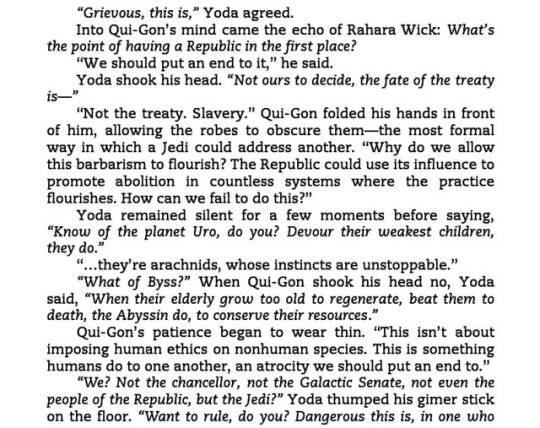
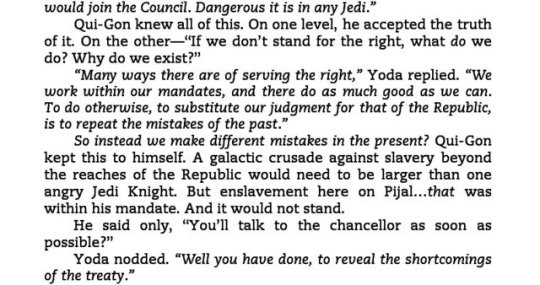



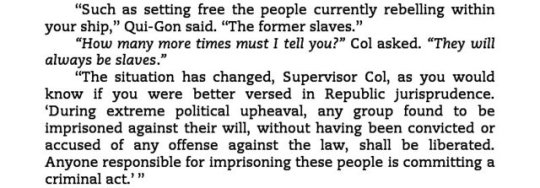



Master and Apprentice | by Claudia Gray
OKAY, HERE’S WHY I KEEP YELLING ABOUT QUI-GON AND HIS AMAZING HYPOCRISY. It’s not just this, there are a bunch of ways (most notably, he completely misjudges the Jedi Council, thinks the worst of them, they hate everything he says, they only want people who agree with them, who lick their boots!, then five minutes later they’re offering him a position on the Council specifically FOR his diverging viewpoints, because they value that, and he STILL refuses to re-evaluate his opinion, STILL refuses to trust them or work with them) but this is really the heart of it.
Qui-Gon believes it’s immoral to do nothing about slavery and he is absolutely right about that. Where he becomes a hypocrite about it is that he believes the Jedi should just go ahead and do whatever they want, they should impose their will on other beings. He grudgingly admits that human morals are not always the same for other species, but insists that slavery is not one of those things. Again, he’s still sort of right, except he’s ignoring that just making people do what you want them to do, instead of going through a democratic process, IS WHAT FASCISM IS. He still wants to just go ahead and go rogue and do whatever they want and his intentions are incredibly well-meant, but he acknowledges nothing of what consequences that would bring.
He acknowledges nothing about how the Jedi are in the same exact position he’s in--there is one Jedi for every 7 to 20 billion beings in the galaxy. If one Jedi isn’t enough to go free the slaves on Pijal by himself--something Qui-Gon never even considers doing--then the Jedi going up against the rest of the galaxy (and, make no mistake, with how clearly canon has established that people fear the Jedi’s inherent abilities, they would absolutely band together and kill the Jedi if they went rogue, the only reason they’re not in the same position as the X-Men is because they realized oversight and accountability goes a long fuckin’ way with people) would be in an even worse position. But he never acknowledges this, nor does he include himself in being immoral for this. No, only the Jedi are immoral for doing exactly what Qui-Gon himself does in an situation that is perfectly analogous. Sure.
Where it gets absolutely INCREDIBLE, though, is that he wins the day and even frees the slaves through his connection to the Republic, through the use of Republic law and might. Why do they have a Republic? FOR THIS MOMENT RIGHT FUCKING HERE. Obi-Wan being an official representative of the Republic (after Qui-Gon is relieved of it for fucking it up) is what allows them to free the slaves. If the Jedi had gone Qui-Gon’s way, this happy ending for the slaves wouldn’t be here.
Does he recognize this? Does he even acknowledge that being part of the Republic is what gives them the authority to do EXACTLY what he did? That if they went rogue, they wouldn’t be able to do this?
Nope.
Nor does he acknowledge that Rael Averross is on the planet, in the position he is, specifically because the Jedi worked with the Republic and worked within the system. The reason this got fucked up is because Rael fell prey to some nasty attachment issues--and, frankly, proved the Jedi’s point in a rather startlingly undeniable way, that he nearly fucked over A THIRD OF THE POPULATION, because he was focused on Fanry only--but if someone who had their shit together was there? THEY COULD HAVE PREVENTED A WHOLE LOT OF SLAVES. Yoda even says it, we have to get that treaty changed, because that’s bad news.
They are helping people and Qui-Gon refuses to acknowledge it, because it’s not how he wants to do it. aka, going in there with lightsaber blazing, damning the wars and deaths--because, let’s also be clear, the second you go in there with force, rather than with legal authority and the law on your side, it’s the slaves who are the hostages in this situation, it’s the slaves who are going to die first, as well as it would have started a war with the entire Republic over the whole thing.
It also makes this moment incredibly hypocritical:

He could go free those slaves. He could just lightsaber Watto in half, take Shmi and Anakin and rather easily (at least as easily as the Jedi could just go do what they wanted in the same way, probably far more so) free the rest of them on Tatooine. Yet, he doesn’t. Why?
Because he has to know, even if he doesn’t want to admit it, that it wouldn’t actually address the underlying problem, it would only result in more deaths of the people who are already the victims here, and it would fuck over all the other people on Naboo who are dying because they’re here. That is exactly the same position the Jedi are in and it’s an understandable one.
You cannot change this situation with leeroy jenkinsing it, because it will only resurface (and get a shitload of people killed along the way). You have to try to change it within the system, you have to work to better the system, you have to keep trying even when it seems hard, because NOTHING WILL EVER LAST unless the system (and the general public) backs you up on this, that is the only way to get things to crawl forward to a better future.
And also let’s be real fuckin’ clear about getting involved with politics--do I think the Jedi should have leaned in harder? Yeah, of course. Literally EVERY PERSON IN THE REPUBLIC should be held to that standard! But the Jedi are not the political power house that we want to think, their influence is tiny in comparison, especially once the war happens and they’re busy putting out twenty tire fires a day and, you know, DYING EN MASSE for a people who don’t want to fight themselves. We do see them trying to advise, to push for better options--and we see Palpatine consistently shutting them down every time they try!
This is also why I think it’s a good idea to read Queen’s Shadow at the same time, as one of the major subplots is basically all about Padme trying to make effective change AS A POLITICIAN, WHERE THIS IS HER FULL TIME JOB and it’s incredibly difficult. Imagine not even having a fraction of the political clout she did and still fighting the same exact uphill battles!
Of course it should (and is) being done, slavery is abhorrent and it’s on the public to hold their governments responsible to enact meaningful change. But I have no patience for those who put forth empty rhetoric over actually offering viable real solutions, not just “Someone should do something!” Like, wow, yes, thank you for that insight, now would you care to share with the class specifically how that could be done without getting everyone killed?
Nor do I have patience for people who criticize methods that are getting actual results and hold themselves to be The Only Moral One Here while not actually offering anything new of substance to the problem that would actually work.

--Queen’s Shadow, by E.K. Johnston
You work with the system (and, in the Jedi’s case, step TWICE AS CAREFULLY, because, hey, guess what, if you seem like you’re getting TOO much power, they’ll literally stand and watch as your Temple burns and your babies are murdered, that’s how little they trust you, how much they fear you, how much they’re just waiting for you to abuse your power, because they don’t understand your connection to a Force that they can’t feel, that it’s not as straightforward as Qui-Gon wants it to be, it’s a hell of a lot more complicated) because that’s how you have any kind of ability to hold people to decent fucking behavior.
It’s like in The Last Jedi where Luke tells Rey that, oh, the Jedi would just say let the attacks happen to the native people. When, no, what they actually did was align themselves with the only reasonable government around (THE OTHER OPTIONS WERE WORSE, LET’S KEEP THAT IN MIND) so they had the ability to say, “If you try this shit again, we have legal authority and the weight of the Republic behind us, to come after you if you come back.”
And that’s what saved the day in this book. Obi-Wan being the Republic’s representative, the weight of the Republic behind them, the law being used in a good and moral way because the Jedi worked to get everything into the right place so that this could have a real happy(-ish) ending, is what let those slaves go free.
Qui-Gon wants the Jedi to go be hippies on backwater planets to connect to the Living Force, but he also wants them to be involved in politics and push harder for democratic reform (WHICH WE SEE THEM DOING BASICALLY IN THIS BOOK) and make the laws, like, that whole thing is absolute mess with no clear direction of what he wants, other than that he wants to be able to whatever he wants whenever he wants and not wanting to face the consequences himself for it, but make others face those consequences. You could leave and do exactly what you’re proposing, Qui-Gon Jinn, but you don’t. And you know why you don’t.
To be clear, in closing, Qui-Gon is not even remotely a bad person, he cares deeply and I wouldn’t have a problem with his point of view if he weren’t judging others for it (a thing that is a theme throughout this book, he gets real judgy sometimes) or maybe if he actually stuck to his own beliefs. He’s coming from a place of deep care, but he is not self-examining on the level he needs to and instead projecting that blame outwards, instead of actually doing something about it.
#qui gon jinn#jedi#jedi order#meta#novels#master and apprentice#master and apprentice spoilers#long post
151 notes
·
View notes